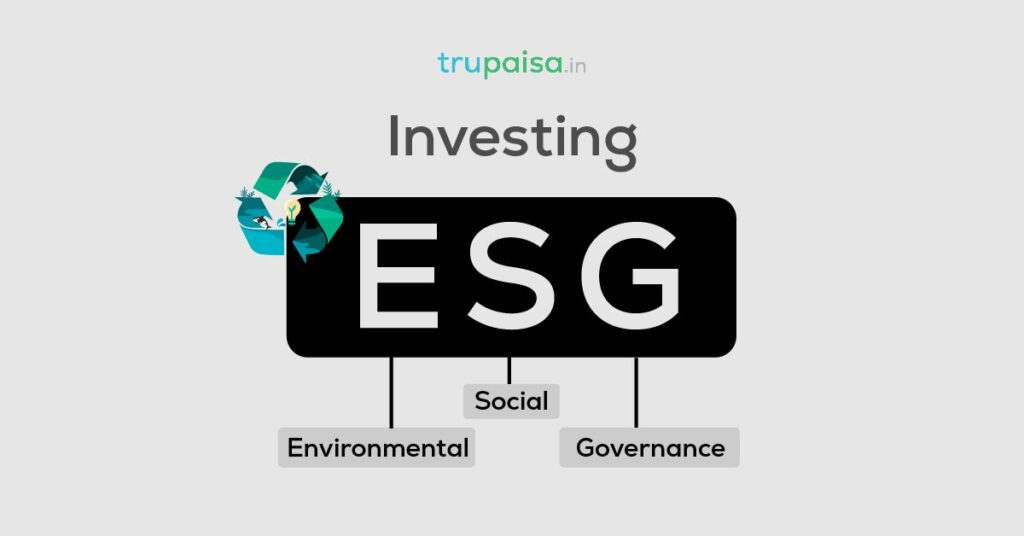ESG stands for Environmental, Social, and Governance. It refers to a set of standards that investors use to evaluate a company’s impact on the environment, society, and its management practices. ESG investing involves investing in companies that prioritize these factors and aim to create a positive impact on the world. It helps investors make informed decisions and supports companies that align with their values.
Where to learn about ESG investing in India? What is the full form of ESG? Need to know more about Axis ESG equity funds!! If, you are investor bothering about these questions, this article is for you.
ESG Investing in India
Every investor faces different challenges, but one of the most important is determining which companies to invest in.
One way to make this decision is to take into account the company’s environmental, social, and governance (ESG) factors. This article explains what ESG investing is, how it works, and some of the benefits it offers investors.

Pro & Cons of ESG Investing in India
There are many benefits of using ESG criteria when making decisions about which companies to invest in: these factors can improve the financial performance of a company as well as its social responsibility profile.
However, there are also some potential drawbacks to taking this approach. Here we look at both the pros and cons of investing in ESG-focused companies.
Pro’s of ESG investing in India
ESG investing can help improve the financial performance of a company by aligning its interests with those of sustainable stakeholders. By doing so, it may be able to attract new investors and support growth while also promoting responsible corporate governance and social responsibility.
Con’s of ESG investing in India
There is a risk that investing in ESG-focused companies could lead to inefficient capital allocation decisions, as well as increased volatility in stock prices – both factors that could have negative consequences for shareholders.
Additionally, some sustainability metrics are difficult to measure or verify, which can make it difficult for investors to ensure that their money is being used in a responsible way.
The pros and cons of investing in ESG-focused companies are complex and nuanced, but overall it seems that the benefits outweigh the drawbacks.
It’s important to remember, though, that ESG investing isn’t without risks – so always consult with an investment advisor before making any decisions.
👉 READ MORE: Top 10 Most Expensive Shares In India
ESG Investing Vs Sustainable Investing

ESG investing is a subset of sustainable investing that focuses on environmental, social, and governance factors.
ESG investing has several advantages over traditional sustainable investment practices, such as identifying environmental issues early and preventing negative consequences from developing.
Additionally, ESG investors can take advantage of opportunities to generate higher returns by focusing on companies with good sustainability practices.
While there are pros to ESG investing, there are also some key considerations you should keep in mind if you’re considering this type of investing.
First and foremost is research – it’s important to know the specifics about each company before making an investment , as there are many factors to consider.
Also, it’s important to be aware of the potential risks associated with investing in ESG-focused companies, which can include loss of investment and social impact due to corporate governance issues or environmental disasters.
👉 READ MORE: 6 Points To Consider Before You Invest in Plot
Benefits of ESG Investing
There are many reasons why taking an ESG-focused approach can be beneficial for your investment portfolio. For example:
- ESG investing may help improve company financial performance by aligning its interests with sustainable stakeholders. This can attract new investors and support growth while promoting responsible corporate behavior.
- ESG investing can reduce the risk of investing in volatile markets, as sustainability metrics are generally less subject to market fluctuations. This can lead to increased investment stability and lower financial risks overall.
- By investing in sustainable companies, you’re likely to see increased customer loyalty and positive social impact – both of which could have a significant impact on shareholder value over time.
- ESG-focused investing may help address environmental or social problems before they become large issues – potentially reducing costs associated with responding after the fact (e..g., remediation). There are a few things to keep in mind when investing in ESG-focused stocks. First, make sure to research the individual companies you’re considering – as some may have less sustainable practices than others. Second, be aware of the risk factors associated with sustainability investments: for example, low valuations or limited liquidity can lead to higher risks and greater losses should sustainability issues arise.
👉 READ MORE: Importance of Personal Finance Planning
How Do I Know Which Investments Are ESG?
There is no one-size-fits-all answer to this question – factors that will impact the sustainability of an investment include company size, industry, and location. However, some general considerations include:
- Investing in companies with sustainable practices reduces environmental impact while increasing financial performance .
- Companies that are environmentally responsible often exhibit better financial stability , offering greater opportunities for growth over long periods of time.
- By focusing on companies with well-defined sustainability goals , ESG investors can help to drive change and improve social responsibility within businesses worldwide .
DO YOU KNOW?
Global ESG-focused assets are projected to reach an impressive $53 trillion by 2025, constituting about one-third of the projected total assets under management.
Types of ESG Funds
ESG funds come in many different shapes and sizes. Some common types include:
- Social impact funds: They are designed to invest in companies that have a positive social impact. They tend to invest in sectors such as healthcare, education, etc.
- Green funds: They are invest in companies that are committed to environmental sustainability.
- Sustainable development goals (SDG) funds: The SDG funds are specifically designed to help companies work towards combating climate change and other sustainable development goals in-line with United Nations’ 17 Sustainable Development Goals.
- Ethical funds: They are invested in companies that adhere to high ethical standards.
ESG Funds Vs Traditional Mutual Funds
ESG mutual funds differ from traditional mutual funds in several ways.
They prioritize investments that benefit the environment, society, and the way the country is run.
Furthermore, they frequently use different criteria’s to select investments and may have different weighting schemes.
Traditional mutual funds are typically managed to maximise profits while ignoring ESG factors. This means that traditional mutual funds may invest in businesses that are harmful to the environment or society.
ESG mutual funds, on the other hand, seek to profit while also doing good for the world. It could imply investing in companies that are the best at lowering their carbon footprints or have good employee relations practises.
Furthermore, ESG mutual funds typically do not invest in companies that engage in controversial activities, such as the manufacture of tobacco or weapons.
Risk involved in ESG Investing
Before investing in an ESG mutual fund, several factors should be considered.
These funds can offer some fantastic benefits, but they also carry some risks. Consider the following points before purchasing an ESG mutual fund:
- Limited Investment Options: When investing in an ESG mutual fund, you should be aware that you may have fewer investment options. It may make it more difficult to find the best investments for your portfolio and may even result in missed opportunities.
- Higher Fees: Finally, you should be aware that the fees for ESG mutual funds are typically higher than those for other investment vehicles. The specialised nature of these funds frequently results in higher operational costs. Before investing, compare fees and decide whether the extra expense.
- Lack of Diversification: Because ESG mutual funds frequently focus on a single type of investment, they may be less diverse than other types of funds. This lack of diversification can increase portfolio volatility and total risk.
Factors to consider when investing in sustainability?
There are a number of factors that should be considered when investing in sustainability, including but not limited to the following:
- The ecological footprint of the product or service – This is a metric that compares the environmental impact of a product or service to its production and consumption. It takes into account things like energy consumption, water usage, waste production and so on.
- The social impact of the product or service – This measures how well the product or service addresses social problems like poverty, human rights abuses or climate change.
- The ethical implications of the product or service – This considers whether the product or service is sustainable in terms of its impact on human health and the environment, as well as its impact on animal welfare and biodiversity.
- The level of innovation – Sustainability can often be achieved through innovative design and technology, which is why it’s important to look for products and services that are cutting-edge and ahead of their time.
How To Invest In ESG Sustainable Funds
Factors that will impact the sustainability of an investment include company size, industry, and location. However, some general considerations include:
- Investing in funds with a strong ESG focus offers investors opportunities to support sustainable businesses while also benefiting from enhanced financial performance .
- Well-designed sustainability indexes target specific types of companies or industries , meaning that there is always coverage available for those looking for it.
- As responsible investing becomes more popular, fund providers are coming up with innovative ways to make their funds more accessible to investors. For example, many now offer “sustainability-focused” mutual funds that are geared towards specific sectors or regions .
Axis ESG Equity Funds
The Axis ESG Equity Fund ( Growth Option) falls in sectoral/ thematic fund category.
Its an open-ended equity fund that invests in companies with environmental, social, and governance (ESG) practices for long term capital appreciation.
The fund aims to achieve long-term financial stability by investing in a diversified range of sustainable companies across different industries.
The Bottom Line
By investing in sustainable companies, ESG investors can help to achieve social responsibility goals and improve environmental sustainability – key benefits for both the individual investor and the global marketplace.
Note:
This is not an investment recommendation. The blog is strictly for informational purposes. Investments in the securities market are subject to market risks; before investing, carefully read all relevant documents.
Past performance does not predict future results. Before selecting a fund or designing a portfolio that meets your needs, please consider your specific investment requirements, risk tolerance, goal, time frame, risk and reward balance, and the cost of the investment.
Any investment portfolio’s performance and returns cannot be predicted or guaranteed.
FAQ
What is full form of ESG?
The acronym “ESG” stands for environmental, social and governance factors. These are factors that can have an impact on a company’s financial performance, including things like human rights practices, climate change mitigation strategies and corporate responsibility reporting.
What is the purpose of ESG?
There are a number of reasons why companies are starting to take ESG seriously. For one, it is important to consider the impact that your business has on the environment and society as a whole. It is also important to make sure that you are doing everything you can to protect the rights of your employees and customers, and to avoid any potential legal issues.
Overall, taking ESG into account is a good way to ensure that you are making responsible decisions that will have long-term benefits for your company. Hopefully, this article has helped you understand what ESG is and why it is important. If you have any additional questions, please feel free to contact us. We would be happy to help!
What are examples of ESG?
Sustainability is the entire spectrum of environmental issues dealing with climate change, energy consumption and pollution mitigation, water use sustainability etc., integrated into long-term economic decisions that impact people and nature in positive ways over multiple generations .
ESG investing can support sustainable business practices by providing financial benefits to companies that demonstrate responsible management across all three dimensions of sustainability: environmental (e g reducing greenhouse gas emissions), social (e g engaging employees in corporate responsibility initiatives) and governance.
What is another name for ESG?
Some of the different names are Social Responsibility, Environmental Conservationism, Corporate Governance, etc.
Does ESG investing work?
Environmental, social, and governance (ESG) investing is a way to invest in companies that have demonstrated responsible environmental and social behavior.
By doing so, you’re helping ensure that these companies continue to behave responsibly in the future – creating benefits for both their financial performance and their social responsibility profile.
What is a sustainability report?
A sustainability report is a document that outlines a company’s environmental, social and governance (ESG) performance. It can include information on emissions levels, waste management practices, renewable energy sources, efforts to reduce water use and reports on many more metrics.
Why is sustainability reporting important?
Sustainability reporting is important for a number of reasons:
- It allows businesses to benchmark their performance against their competitors and see where they can improve.
- It helps businesses to identify and track trends in the industry, so they can make informed decisions about how to best serve their customers.
- It can help businesses to demonstrate their social responsibility and commitment to sustainability.
In short, sustainability reporting is a critical tool that can help businesses achieve their goals and achieve long-term success
Few Mutual funds focused on ESG
- SBI Magnum Equity ESG. This fund focus has a large-cap stocks.
- Quantum India ESG Equity. It has a multi-cap stocks in its portfolio and focus more on large-cap stocks.
- Axis ESG Equity Fund. This fund focus predominately on large-cap stocks.
- Franklin build India fund.
- Aditya Birla Sun Life Advantage Fund
Differences between ESG and impact investing?
ESG investing and impact investing are two different types of investment strategies. esg investing is focused on responsible management across all three dimensions of sustainability: environmental (e.g., reducing greenhouse gas emissions), social (e.g., engaging employees in corporate responsibility initiatives) and governance (e.g., transparency around relationships with key stakeholders). impact investing, by contrast, focuses exclusively on financial returns while minimizing social and environmental impacts.
Is ESG investing a bubble in the making?
There are concerns that ESG investing may be a bubble in the making, with some experts warning of a potential burst.
While ESG investing has gained popularity in recent years, some argue that the hype around it may be overblown, leading to inflated valuations and unsustainable growth. However, others argue that ESG investing is here to stay and that it represents a fundamental shift in the way investors approach sustainability and social responsibility.
As with any investment trend, it is important for investors to conduct thorough research and due diligence to determine whether ESG investing aligns with their investment goals and risk tolerance.
Is there a difference between ESG and ECM?
There’s a distinction between environmental sustainability (ecm) and social responsibility (esg), but the terms are often used interchangeably. Ecm focuses on environmental factors such as energy efficiency and reducing waste, while esg takes into account issues such as human rights, labour practices and climate change.
What factors should I consider when investing in sustainability?
Environmental factors – Evaluate a company’s environmental footprint, including emissions levels and waste management practices. Look for sustainable forestry practices, renewable energy sources and efforts to reduce water use.
Social factors – Are employees engaged in corporate responsibility initiatives? Is the company using responsible supply chains? Does it have positive social impact goals?
Governance factors – Does the company have responsible management practices? Is its governance structure transparent and fair?
What does ECM stand for?
Environmental capital management refers to business practices and investments that improve environmental performance by reducing environmental impact, promoting resource conservation, restoring degraded ecosystems, or improving air and water quality.
ESG investing is a subset of ECM and refers to responsible investment practices that focus on environmental, social, and governance factors.
Does ESG investment add value to investors?
ESG is a new concept that has gained popularity in recent years.
As of now, it is more policy or governance driven and less return oriented. As governments recognize the importance of climate change (as evidenced by the Paris Agreement), they are focusing more on environmental and social health issues and developing policies accordingly.
As a result, the concept/guideline has spread to corporations as well. Corporates are emphasizing their ESG projects and focusing on being carbon neutral, which allows them to raise funds from the market with this label.
Similarly, investors have a guideline or goal in mind when investing in ESG projects.
Is Axis ESG equity funds safe for conservative investors?
As per SEBI, Axis ESG equity fund is classified in high risk category. If at all you are keen to invest in this fund, allocate very small portion of your allocation.
What is the ideal time frame to Invest in Axis ESG Equity Fund – Regular Plan?
Ideally you should hold this fund for more than 3 years. However longer you stay invested, higher will be the chances to gain alpha returns on Axis ESG equity fund.
Why are ESG funds gaining popularity worldwide?
Companies with strong ESG credentials outperform their peers in the long run, according to growing evidence. Furthermore, an increasing number of investors are concerned about the social and environmental impact of their investments. As a result, ESG funds are in high demand.
Differences: ESG Vs SRI (Socially Responsible Investing) Vs Impact Investing?
Companies with strong ESG credentials outperform their peers in the long run, according to growing evidence. Furthermore, an increasing number of investors are concerned about the social and environmental impact of their investments. As a result, ESG funds are in high demand.
Differences: ESG Vs SRI (Socially Responsible Investing) Vs Impact Investing?
There are a lot of different terms used to describe investments that focus on social and environmental factors. Here are a few of the most common:
Environmental, social, and governance (ESG) investments – These are investments that focus on the impact that a company’s activities have on the environment, society, and governance. They may require companies to report on their social and environmental impacts, or they may include specific ESG criteria in their investment decisions.
Socially responsible investing (SRI) – This is an investment philosophy that focuses on companies that adhere to certain social and environmental standards. Some of the most common SRI principles include avoiding excessive risk, choosing companies with a good track record of responsible management, and investing in companies with a positive impact on society as a whole.
Impact investing – Impact investors aim to achieve positive social and environmental outcomes by financing projects that have the potential to make a significant impact. They may do this through direct investment in projects or through funds that invest in a variety of impact-focused securities.
LATEST POST
- Best Paper Trading Application In India
- Ashneer Grover Net Worth: Income, Wealth & LifeStyle!
- Stock Trading In India For Beginners: Step By Step Guide
- Vastu Shastra For Home: Boost Positive Energy Of Your Home.
- ESG Full Form || ESG Investing: A Complete Guide
2024 apartment Banking biography book review books Broking cards cibil score complete guide credit cards demat esg investment facts finance fintech flats forex governement schemes home home buying home loan investment loan mindset mind to matter mivan technologies mutual funds neobanks nri OC and CC p2p personal finance plots plots in lucknow reading habits real estate real estate terms retirement planning reviews stock market tax benefit taxes trading vastu








